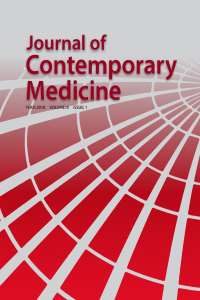Şizofrenide Nörobilişsel Bozukluklar Ve İşlevsellikle İlişkisi
şizofreni, nörobilişsel bozukluk, işlevsellik
The relationship between neurocognitive dysfunction and functionality in schizophrenia
schizophrenia, neurocognitive dysfunction, functionality,
___
- 1. Green MF, What are the functional consequences of neurocognitive deficits in schizophrenia? Am J Psychiatry, 1996. 153(3): p. 321-30.
- 2. Özen NE, Yüksel N, Kognitif Nörobilimler, Nobel Tıp Kitabevleri, Ankara, 2010.
- 3. Lepage M, Bodnar M, and Bowie CR, Neurocognition: clinical and functional outcomes in schizophrenia. Can J Psychiatry, 2014. 59(1): p. 5-12.
- 4. Heinrichs RW and Zakzanis KK, Neurocognitive deficit in schizophrenia: a quantitative review of the evidence. Neuropsychology, 1998. 12(3): p. 426-45.
- 5. Keefe RSE, Eesley CE, Neurocognitive Impairments. Textbook of Schizophrenia. 2006: The American Psychiatric Publishing.
- 6. Bora E and Murray RM, Meta-analysis of cognitive deficits in ultra-high risk to psychosis and first-episode psychosis: do the cognitive deficits progress over, or after, the onset of psychosis? Schizophr Bull, 2014. 40(4): p. 744-55.
- 7. Bortolato B, et al., Cognitive dysfunction in bipolar disorder and schizophrenia: a systematic review of meta-analyses. Neuropsychiatr Dis Treat, 2015. 11: p. 3111-25.
- 8. Brewer WJ, et al., Generalized and specific cognitive performance in clinical high-risk cohorts: a review highlighting potential vulnerability markers for psychosis. Schizophr Bull, 2006. 32(3): p. 538-55.
- 9. Addington J and Barbato M, The role of cognitive functioning in the outcome of those at clinical high risk for developing psychosis. Epidemiol Psychiatr Sci, 2012. 21(4): p. 335-42.
- 10. Ceylan ME, Araştırma ve Klinik Uygulamada Biyolojik Psikiyatri - Şizofreni 1. Cilt. 2009: İstanbul. p. 75-831.
- Yayın Aralığı: Yılda 6 Sayı
- Başlangıç: 2011
- Yayıncı: Rabia YILMAZ
Pulmoner Emboli Hastalarında Nötrofil/Lenfosit Oranı ve Trombosit/Lenfosit Oranı
Serdar Savaş GÜL, Nurşah BAŞOL
Tıp Fakültesi Öğrencilerinin Hasta Güvenliği Kültürüne İlişkin Tutum Ölçeğinin” Türkçeye Uyarlanması
Nazan TORUN, Metin DİNÇER, Dilek ÖZTAŞ, Pervin DEMİR, Selim Yavuz SANİSOĞLU
Acil Servise Başvuran Hastalarda Post Operatif Komplikasyonların Epidemiyolojik İncelenmesi
Tıp Fakültesi Öğreticisinden Kurban Bayramı Sonrası Elde Orf Enfeksiyonu
Bülent GÜNERİ, Murat ÜZEL, Mustafa KINAŞ
Çocuk Hastada Rüptüre Pulmoner Kist Hidatik
Şamil HIZLI, Hülya SERTÖZ, Mine TINMAZ, Aydın ÇELİK, Mesut KOCAK, Sadi KAYA, Gonca YILMAZ
Şizofrenide Nörobilişsel Bozukluklar Ve İşlevsellikle İlişkisi
Erişkin bir visseral leishmaniazis olgusu: tanı ve tedavi seçeneklerinin irdelenmesi
